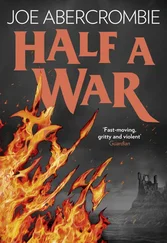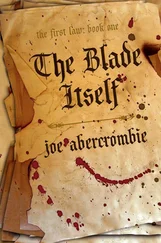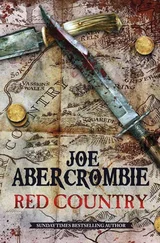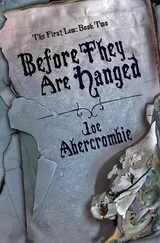“What master?”
“Glustrod.”
The name was like a knife in the ear. No name could’ve been less expected, or less welcome. The wind blew cold through the trees, and memories of the towering ruins of Aulcus crowded in on Logen, and made his back shiver. “No chance it’s some different Glustrod than the one came close to destroying half the world?”
“There is no other. He it was that wrote the signs upon the Feared’s skin. Signs in the Old Tongue, the language of devils, across his left side. That flesh is of the world below. Where the word of Glustrod is written, the Feared cannot be harmed.”
“Cannot be harmed? Not at all?” Logen thought about it a moment. “Why not write on both sides?”
“Ask Glustrod.”
“I don’t think that’s likely.”
“No.” A long pause. “What will you do, Ninefingers?”
Logen peered off sideways into the trees. The notion of setting off running, and never looking back, seemed a pretty one, right then. Sometimes it can be better to live with the fear of it, than to die doing it, whatever Logen’s father had told him.
“I ran before,” he muttered, “and I only ran a circle. For me, Bethod’s at the end of every path.”
“Then that is all our talk.” The spirit stood up from the fire.
“Perhaps I’ll see you again.”
“I do not think so. The magic leaks from the world, and my kind sleep. I do not think so. Even if you beat the Feared, and I do not think you will.”
“Message o’ hope then, eh?” Logen snorted. “Luck go with you.”
The spirit faded back into the darkness, and was gone. It did not wish Logen luck. It did not care.
It was a dour and depressing meeting, even for the Closed Council. The weather beyond the narrow windows was sullen and overcast, promising storms but never delivering, casting the White Chamber into a chill gloom. From time to time heavy gusts of wind would rattle the old window panes, making Jezal start and shiver in his fur-trimmed robe.
The grim expressions of the dozen old faces did little to warm his bones. Lord Marshal Varuz was all clenched jaw and harsh determination. Lord Chamberlain Hoff clutched his goblet like a drowning man clinging to the last fragment of his boat. High Justice Marovia frowned as though he were about to pronounce the death sentence on the entire gathering, himself among them. Arch Lector Sult’s thin lip was permanently curled as his cold eyes slid from Bayaz, to Jezal, to Marovia, and back.
The First of the Magi himself glared down the table. “The situation, please, Lord Marshal Varuz.”
“The situation, honestly, is grim. Adua is in uproar. Perhaps one third of the population has already fled. The Gurkish blockade means that few supplies are making it to the markets. Curfews are in place but some citizens are still seizing the opportunity to rob, steal and riot while the authorities are occupied elsewhere.”
Marovia shook his head, grey beard swaying gently. “And we can only expect the situation to deteriorate as the Gurkish come closer to the city.”
“Which they are,” said Varuz, “at the rate of several miles a day. We are doing all we can to frustrate them, but with our resources so limited… they may well be outside the gates within the week.”
There were a few shocked gasps, breathed oaths, nervous sideways glances. “So soon?” Jezal’s voice cracked slightly as he said it.
“I am afraid so, your Majesty.”
“What is the Gurkish strength?” asked Marovia.
“Estimates vary wildly. At present however…” and Varuz sucked worriedly at his teeth, “it appears they field at least fifty thousand.”
There were further sharp intakes of breath, not least from Jezal’s own throat. “So many?” muttered Halleck.
“And thousands more landing every day near Keln,” put in Admiral Reutzer, doing nothing to lift the mood. “With the best part of our navy on its way to retrieve the army after its northern adventure, we are powerless to stop them.”
Jezal licked his lips. The walls of the wide room seemed to close in further with every moment. “What of our troops?”
Varuz and Reutzer exchanged a brief glance. “We have two regiments of the King’s Own, one of foot and one of horse, some six thousand men in all. The Grey Watch, tasked with the defence of the Agriont itself, numbers four thousand. The Knights Herald and of the Body form an elite of some five hundred. In addition, there are non-combat soldiers—cooks, grooms, smiths, and so forth—who could be armed in an emergency—”
“I believe this qualifies,” observed Bayaz.
“—perhaps some few thousand more. The city watch might be of some use, but they are hardly professional soldiers.”
“What of the nobles?” asked Marovia. “Where is their aid?”
“Some few have sent men,” said Varuz grimly, “others only their regrets. Most… not even that.”
“Hedging their bets.” Hoff shook his head. “Brock has let it be known there will be Gurkish gold for those who help him, and Gurkish mercy for those who stand with us.”
“It has ever been so,” lamented Torlichorm. “The nobles are interested only in their own welfare!”
“Then we must open the armouries,” said Bayaz, “and we must not be shy with their contents. We must arm every citizen who can hold a weapon. We must arm the labourers’ guilds, and the craftsmens’ guilds, and the veterans’ associations. Even the beggars in the gutters must be ready to fight.”
All well and good, Jezal supposed, but he hardly cared to trust his life to a legion of beggars. “When will Lord Marshal West return with the army?”
“If he received his orders yesterday, it will be a month at the very least before he is disembarked and ready to come to our aid.”
“Which means we must withstand several weeks of siege,” muttered Hoff, shaking his head. He leaned close to Jezal’s ear and spoke softly, quite as if they were schoolgirls trading secrets. “Your Majesty, it might be prudent for you and your Closed Council to leave the city. To relocate your government further north, outside the path of the Gurkish advance, where the campaign can be conducted in greater safety. To Holsthorm, perhaps, or—”
“Absolutely not,” said Bayaz sternly.
Jezal could scarcely deny that the notion held its attractions. The island of Shabulyan at that moment seemed an ideal place to relocate his government to—but Bayaz was right. Harod the Great would hardly have entertained the idea of retreat, and neither, unfortunately, could Jezal.
“We will fight the Gurkish here,” he said.
“Merely a suggestion,” muttered Hoff, “merely prudence.”
Bayaz spoke over him. “How do the defences of the city stand?”
“We have, in essence, three concentric lines of defence. The Agriont itself is, of course, our last bastion.”
“It will not come to that, though, eh?” chuckled Hoff, with far from total conviction.
Varuz decided not to answer. “Arnault’s Wall is beyond it, enclosing the oldest and most crucial parts of the city—the Agriont, the Middleway, the main docks and the Four Corners among them. Casamir’s Wall is our outermost line of defence—weaker, lower, and a great deal longer than Arnault’s. Smaller walls run between these two, like the spokes of a wheel, dividing the outer ring of the city into five boroughs, each of which can be sealed off, should it be captured by the enemy. There are some built-up areas beyond Casamir’s Wall, but those must be immediately abandoned.”
Bayaz planted his elbows on the edge of the table, his meaty fists clasped together. “Given the number and quality of our troops, we would be best served by evacuating the outer quarters of the city and concentrating our efforts around the much shorter and stronger length of Arnault’s wall. We can continue to fight a rear-guard action in the outer boroughs, where our superior knowledge of the streets and buildings stands in our favour—”
Читать дальше









